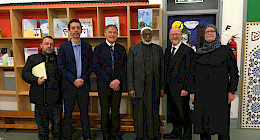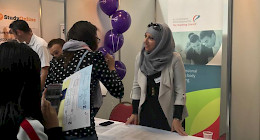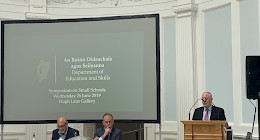
Selected from the press Oct - Nov 2017

6 years ago
The MPEB brings you a selection of education articles from Irish media outlets for the months of May & Jun 2017.
Children in Gaelscoileanna to learn foreign languages
New initiative will see junior infants taught subjects only through French, German or other languages
Irish-speaking primary schools are to start teaching foreign languages such as French or German from junior infants onwards under a new initiative. An Foras Pátrúnachta, the patron body for more than 70 Gaelscoileanna, is to launch a pilot project where children will be taught a subject – such as maths, for example – exclusively through an additional language.
Caoimhín Ó hEaghra, the patron body’s general secretary, said this immersive method of language learning was already taking place through Irish across its school network.
“Research shows that children who attend bilingual schools have the capacity to learn a third or fourth language more easily,” he said.
“In the context of Brexit, we’re acutely aware of the rising need for a multilingual workforce. We think Gaelscoileanna are really well-placed to build on our immersion model and to introduce another language.”
He said the exact language to be introduced to classes or schools will depend on the expertise of the individual teacher. Mr Ó hEaghra said teachers in Gaelscoileanna were more likely to have qualifications in other languages.
“We have many schools where teachers have a third-level qualification in a foreign language. It’s the nature of our schools. This will allow us to tap into the linguistics skills teachers already have.”
Everything in our schools would be taught completely as Gaeilge, with the exception of one subject. That would be taught through a third language such as GermanHe said training will be made available to teachers and details of the number of participating schools in a pilot stage will be announced shortly. The method of teaching part of the curriculum through a third language is known in education circles as “content and language integrated learning”.
Research over the past two decades indicates this method is linked to impressive results.
Experts are due to discuss these research methods at An Foras Pátrúnachta’s national conference in Mullingar on Saturday. They include the co-founder of the European Language Council, Prof Piet Van de Craen, one of Europe’s main specialists of this approach.
Mr Ó hEaghra said: “The most effective way to do this is from junior infants right the way through to sixth class. So, everything in our schools would be taught completely as Gaeilge, with the exception of one subject.
“That would be taught through a third language such as German, French, Spanish or Italian. The research shows this is the most successful way of learning a language.”
Meanwhile, Minister for Education Richard Bruton is set to launch a new foreign languages strategy shortly which will see Chinese and other foreign languages added to the Leaving Cert. It is aimed at preparing the State for the economic threat posed by Brexit and the rise of non-Western countries.
The new 10-year strategy is understood to include ambitious targets to increase the number of students studying foreign languages.
Polish, Lithuanian and Portuguese will also be introduced as “heritage languages” on the Leaving Cert curriculum, aimed at immigrant communities.
The introduction of Mandarin Chinese as a new subject on the curriculum is part of a bid to ensure the system is educating students in languages that are also target markets for exports.
The new blueprint acknowledges Ireland has not prioritised the learning of foreign languages, tending to regard English as a common international language.
The original article was published on Nov 21, 2017 by Carl O'Brien of the Irish Times and is available here.
Parent guide: how to find your child’s school inspection report
School education rated from ‘very good’ to ‘poor’ under inspection regime
It’s over ten years since the Department of Education published their first individual school inspection reports. It was long overdue: the move was aimed at the time at dampening demand for school league tables by providing parents with information on school performance.
However, critics said the these reports were fairly anodyne, with critical findings couched in diplomatic language which required parents to read between the lines.
In a change introduced a year ago, Minister for Education Richard Bruton says inspectors have been measuring the quality of education in schools on a sliding scale that ranges from “very good” to “weak”.
The most comprehensive reports are “whole-school evaluations’. These measure the quality of the school management and leadership, the quality of teaching, learning and assessment, and the school’s own planning and self-review.
To find a whole-school inspection report for your school, visit here. At second level, there are also subject inspection reports which evaluate the teaching and learning of individual subjects. They are available here.
Minister for Education Richard Bruton says these revised reports are more meaningful for parents and teachers. He says new guidelines on inspections and best practice in schools make clear the standards which we want schools to aspire to achieve.
“Probably the biggest change for parents and teachers is the new inspection reports that have begun to be published over the last year,” Mr Bruton said.
“The new inspection reports contain clearer statements about the quality of the school’s work that is examined in each inspection. They also include information that helps readers understand the judgements that inspectors make.”
Parents do not necessarily get the full picture. For example, there is no specific information on any underperforming teachers or principals.
However, the first fitness to practice hearings for teachers are due to get underway next week, which officials say will be a major step forward in ensuring public confidence in the teaching profession.
How to read individual inspection reports:
“Very good”
This applies where the quality of the areas evaluated is of a very high standard. The very few areas for improvement that exist do not significantly impact on the overall quality of provision. For some schools in this category the quality of what is evaluated is outstanding and provides an example for other schools of exceptionally high standards of provision.
“Good”
Good applies where the strengths in the areas evaluated clearly outweigh the areas in need of improvement. The areas requiring improvement impact on the quality of pupils’ learning. The school needs to build on its strengths and take action to address the areas identified as requiring improvement in order to achieve a very good standard.
“Satisfactory”
Satisfactory applies where the quality of provision is adequate. The strengths in what is being evaluated just outweigh the shortcomings. While the shortcomings do not have a significant negative impact they constrain the quality of the learning experiences and should be addressed in order to achieve a better standard.
“Fair”
Fair applies where, although there are some strengths in the areas evaluated, deficiencies or shortcomings that outweigh those strengths also exist. The school will have to address certain deficiencies without delay in order to ensure that provision is satisfactory or better.
“Weak”
Weak applies where there are serious deficiencies in the areas evaluated. Immediate and coordinated whole-school action is required to address the areas of concern. In some cases, the intervention of other agencies may be required to support improvements.
The original article was published on Nov 4, 2017 by Carl O'Brien of the Irish Times and is available here.
Bill will stop Gaelscoileanna prioritising naíonra pupils
Admissions legislation aiming at greater fairness in Irish school enrolment
Minister for Education Richard Bruton: draft legislation prohibits schools from applying a priority in admission based on attendance at a specific pre-school. Gaelscoileanna will no longer be able to prioritise places for children from Irish-speaking pre-schools under new school admissions legislation.
Currently, a key attraction among parents for naíonraí – which provide pre-school education exclusively through Irish – is their potential to provide a route into oversubscribed Gaelscoileanna.
Almost 5,000 children outside the Gaeltacht attend more than 260 pre-school services where all interaction with the children is through Irish.
However, a new Education (Admission to Schools) Bill will prohibit schools from giving priority to children based on their attendance at a specific pre-school.
Bláthnaid Ní Ghréacháin, chief executive of Gaeloideachas, a voluntary organisation that supports the development of Irish-medium schools, said the move will harm development of the language.
She said the planned changes will undermine the ability of naíonraí and schools to promote a full four years of immersion in Irish – two years of immersion in the naíonra and two in the infant classes in school – which is recognised internationally as best practice.
Naíonraí are a vulnerable minority in an early-years sector that’s already at breaking point,” she said. In a statement, a spokesman for the Department of Education confirmed that the draft legislation prohibits schools from applying a priority in admission based on attendance at a specific pre-school.
Transparent policies
The rules are aimed at ensuring greater fairness and transparency in school enrolment policies.
Ms Ní Ghréacháin said difficulties facing the early-years sector – such as underfunding and the recruitment and retention of qualified staff – are magnified further for naíonraí.
“Many naíonraí are reliant on their relationship with their local Irish-medium primary schools and work with them to agree common aims, teaching methods and supported transitions,” she said.
“Some also rely on their relationship with the school for practical support around accommodation and administration.”
She added: “Even though they’re recognised as being of huge importance to the future of the Irish language by the State . . . few if any practical measures are being taken to ensure their viability or to mitigate the negative impact the proposed admissions Bill will have on them.”
Irish-medium schools
Figures compiled by Gaelscoileanna indicate that about 35 per cent of Irish-medium schools outside the Gaeltacht are over-subscribed, especially in urban or commuter belt areas.
The issue of whether Gaelscoileanna can prioritise children where Irish is the dominant language in the home is a separate matter being examined by department officials. Most Gaelscoileanna allow for children in these settings to be prioritised in their admission policies, but say they account for just 3 per cent of their admissions.
Minister for Education Richard Bruton has indicated he will amend draft admissions legislation to allow for an exemption to be made for these students (where Irish is the dominant language in the home). This matter is being considered by the Attorney General, according to Department of Education sources, and an “appropriate” amendment is due when the legislation is next debated in the Oireachtas.
The original article was published on Nov 23, 2017 by Carl O'Brien of the Irish Times and is available here.
Minister Bruton announces changes to Minimum Entry Requirements for Primary Teacher Training Programmes
The Minister for Education and Skills Richard Bruton T.D. has announced the minimum entry requirements for primary initial teacher education programmes for the 2018/2019 academic year.
In addition to the points required for entry to programmes of primary initial teacher education, the Department of Education and Skills specifies minimum entry requirements in the core subjects: Maths, English and Irish. This is to ensure that primary teachers have the capacity to lead learning in these vital areas.
Changes being announced today set higher minimum entry standards to programmes of primary initial teacher education programmes for Leaving Certificate Maths and English at Ordinary Level and Irish at Higher Level. The changes are as follows:
Subject
2018
2019 & 2020
Irish
Grade
%
Grade
%
H5
50<60
H4
60<70
English
O5
50<60
O4
60<70
or
or
H7
30<40
H7
30<40
Maths
O6
40<50
O4
60<70
or
or
H7
30<40
H7
30<40
In line with the new policy to encourage wider participation in the more challenging Higher Level papers, a H7 (which is equivalent for points to an O3) will meet the minimum entry requirement for Maths and English.
In determining the entry requirements care was taken not to disadvantage those students who have already commenced the senior cycle and who intend sitting the Leaving Certificate examinations in 2018. The Minister also had regard to the Department’s policy “Supporting a Better Transition from Second Level to Higher Education – Implementation and Next Steps” (2015).
Minister Bruton stated: “We are very fortunate here in Ireland to attract excellent candidates into primary education teaching and the quality of Ireland’s education system is recognised internationally, but to be the best we need to continuously improve. Through the achievement of the actions set out in the Action Plan for Education, which aims to make the Irish education and training system the best in Europe within a decade, we aim to ensure that leadership, management, quality frameworks, teaching methods, and initial and continuing training are all operating to the highest standards across the continuum of education and training provision.
One of the objectives in the Action Plan for Education 2017 is to “develop the continuum of teacher education to equip teachers with the right skills for 21st century teaching and learning and improve school leadership”. The continued reform of initial teacher training and teacher induction, including the revision of entry criteria for initial teacher education, is one of a number of actions which were formulated to achieve this objective.”
Further changes to the minimum entry requirements from 2021 onwards will be considered in the light of experience, relevant policy developments and following consultation with relevant stakeholders.
It has also been decided that with regard to the minimum entry requirements for entry to primary initial teacher education programmes in 2017, a Leaving Certificate H7, which attracts the same CAO points as an O3, should be accepted as the minimum entry requirement for Maths and English. This is consistent with the decision on the entry requirements for 2018-20.
Decisions on the above have been communicated to the Universities and Colleges concerned and the Teaching Council.
Note for Editors
Supporting a Better Transition from Second Level to Higher Education – Implementation and Next Steps (2015)
Supporting a Better Transition from Second Level to Higher Education – Implementation and Next Steps sets out a package of reforms developed in partnership with stakeholders which are designed to improve the transition experience of students moving from second level to higher education.
Those reforms introduced a new grading scheme for the Leaving Certificate, a new relationship between Higher and Ordinary Levels and a revised Common Points Scale. They aim, inter alia, to encourage the take-up of Higher Level subjects at Leaving Certificate by awarding points to the new H7 grade (30-40%).
It was agreed that the Department, its agencies and relevant institutions would align relevant policies and processes so as to give broad effect to this policy from 2017. The new grading and points system were introduced for the first time for those students sitting the Leaving Certificate in 2017.
The original article was published on Oct 3, 2017 by the Department of Education and Skill and is available here.





